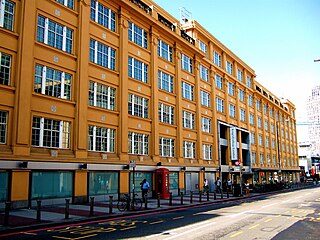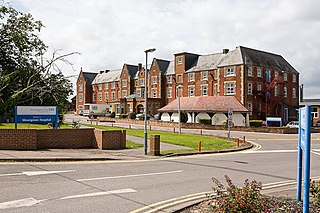
The Florence Nightingale Faculty of Nursing, Midwifery & Palliative Care is an academic faculty within King's College London. The faculty is the world's first nursing school to be continuously connected to a fully serving hospital and medical school. Established on 9 July 1860 by Florence Nightingale, the founder of modern nursing, it was a model for many similar training schools through the UK, Commonwealth and other countries for the latter half of the 19th century. It is primarily concerned with the education of people to become nurses and midwives. It also carries out nursing research, continuing professional development and postgraduate programmes. The Faculty forms part of the Waterloo campus on the South Bank of the River Thames and is now one of the largest faculties in the university.

Matron is the job title of a very senior or the chief nurse in a hospital in several countries, including the United Kingdom, and other Commonwealth countries and former colonies.

North Manchester General Hospital (NMGH) is a large NHS hospital in Crumpsall, North Manchester, England. It is operated by Manchester University NHS Foundation Trust. There is an accident and emergency unit, together with a maternity unit, high dependency unit and a mental health wing. A plan to rebuild the hospital was announced by Boris Johnson in the 2019 General Election campaign, and in November 2020 a £54 million funding bid for improvement works was made by the Trust, Manchester City Council, and Manchester Health and Care Commissioning.

City Hospital was a major hospital located in Birmingham, England, operated by the Sandwell and West Birmingham Hospitals NHS Trust. It provided an extensive range of general and specialist hospital services. It is located in the Winson Green area of the west of the city.

Moorgreen Hospital was a community hospital in West End, near Southampton. It was managed by Southampton City Primary Care Trust.
Nursing management consists of the performance of the leadership functions of governance and decision-making within organizations employing nurses. It includes processes common to all management like planning, organizing, staffing, directing and controlling. It is common for registered nurses to seek additional education to earn a Master of Science in Nursing or Doctor of Nursing Practice to prepare for leadership roles within nursing. Management positions increasingly require candidates to hold an advanced degree in nursing.

The Queen's Nursing Institute (QNI) is a charity that works to improve the nursing care of people in their own homes in England, Wales, and Northern Ireland. It does not operate in Scotland, where the Queen's Nursing Institute Scotland performs a similar function. The QNI is also affiliated to the Queen's Institute of District Nursing in Ireland. The QNI is a member of the International Council of Nurses.

Nantwich Workhouse, also known as Nantwich Union Workhouse, Nantwich Union House and Nantwich Institution, is a former workhouse in Nantwich, Cheshire, England. It is located at The Barony, off Barony Road. Built in 1779–80 to accommodate up to 350 people, the institution remained in use as a workhouse until 1930.

St Leonard's Hospital is a hospital in Hoxton, London.

Liverpool Women's Hospital is a major obstetrics, gynaecology and neonatology research hospital in Liverpool, England. It is one of several specialist hospitals located within the Liverpool City Region, alongside Alder Hey Children's Hospital, Liverpool Heart and Chest Hospital, the Walton Centre, Mersey Regional Burns and Plastic Surgery Unit and Clatterbridge Cancer Centre. It is managed by the Liverpool Women's NHS Foundation Trust. The hospital receives approximately 50,000 patients annually and is the largest hospital for its specialism in Europe.
The history of nursing in the United Kingdom relates to the development of the profession since the 1850s. The history of nursing itself dates back to ancient history, when the sick were cared for in temples and places of worship. In the early Christian era, nursing in the United Kingdom was undertaken by certain women in the Christian Church, their services being extended to patients in their homes. These women had no real training by today's standards, but experience taught them valuable skills, especially in the use of herbs and folk drugs, and some gained fame as the physicians of their era. Remnants of the religious nature of nurses remains in Britain today, especially with the retention of the job title "Sister" for a senior female nurse.

Highgate Hospital was a name used to refer to the infirmary building which opened in 1869 on the St Pancras side of Dartmouth Park Hill in Highgate, London.
The Bedwellty Union Workhouse was situated in Georgetown, Tredegar. It is 2.9 miles (4.7 km) from the Nanybwtch Junction A465. The building was in existence for approximately 127 years. The workhouse building was also used as a hospital. Today, the site where the building once stood, there is a housing estate known as St James Park.
Workhouse infirmaries were established in the nineteenth century in England. They developed from the Workhouse and were run under the Poor law regime.
Rosalie Dreyer was a Swiss-born naturalised British nurse and administrator. Immigrating to England at the age of eighteen, she trained as a nurse in London and worked her way through the ranks to become matron, principal matron and chief matron-in-charge of the Nursing Service of the London County Council. Dreyer was a pioneer in the development of Britain's public-funded nursing service.

The Edinburgh City Hospital was a hospital in Colinton, Edinburgh, opened in 1903 for the treatment of infectious diseases. As the pattern of infectious disease changed, the need for in-patients facilities to treat them diminished. While still remaining the regional centre for infectious disease, in the latter half of the 20th century the hospital facilities diversified with specialist units established for respiratory disease, ear, nose and throat surgery, maxillo-facial surgery, care of the elderly and latterly HIV/AIDS. The hospital closed in 1999 and was redeveloped as residential housing, known as Greenbank Village.
Bethnal Green Hospital was an acute care hospital, in Bethnal Green in the London Borough of Tower Hamlets, England. It opened in 1900, and it closed in 1990.
Anne Campbell Gibson was matron of the Birmingham Union Infirmary (1888-1912) and notable for her contributions to workhouse nursing and pioneering the establishment of infirmaries separate from workhouses and staffed with trained nurses.
The Association of Hospital Matrons was a professional organization of hospital matrons in the United Kingdom, founded in 1919. At its meeting on 23 December 1971 it changed its name in to the Association of Nurse Administrators from January 1972. It was officially dissolved on 31 December 1986, and amalgamated with the Royal College of Nursing Association of Nursing Management in January 1987.











